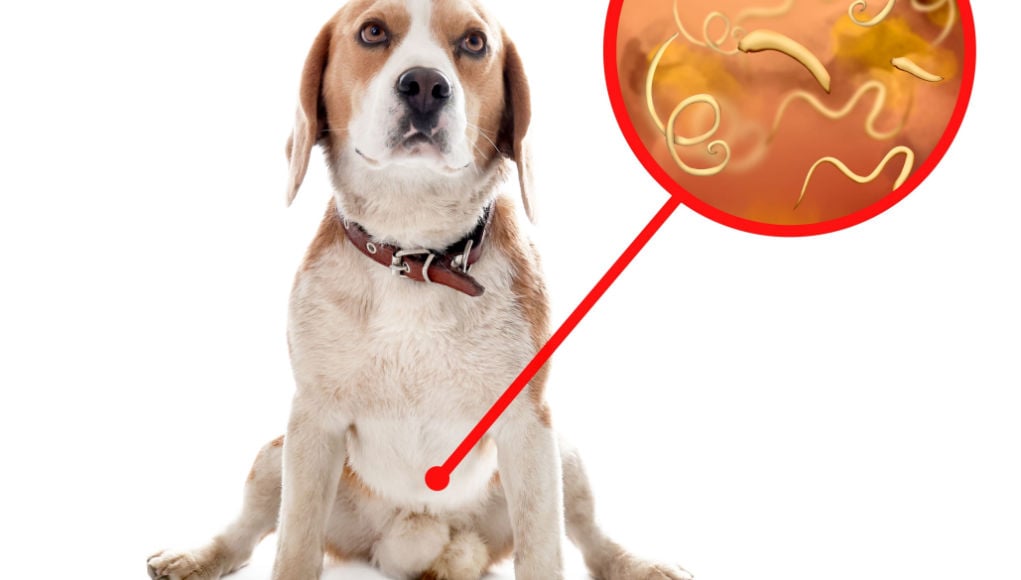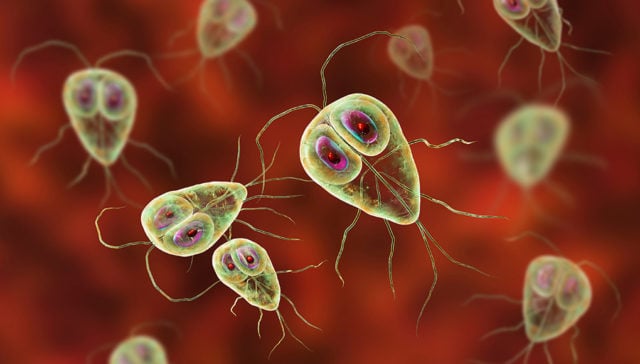
Table of Contents
They're not ticks; they're not mites — yup, giardia are parasites!
The truth is, keeping your dogs healthy and secure isn't a breeze, especially when microorganisms try to multiply and wreak havoc on their body.
What's even worse?
Giardia infections in your dogs are found to be contagious, too.
“But are there home remedies for giardia in dogs?”
Don't worry; you've come to the right resource.
And as you go on in this article, you'll learn more about:
- What this infection is all about
- Symptoms of giardia infection in dogs
- Easy home remedies for giardia in dogs
- How to protect your dogs from this parasitic infection
- And so much more!
So, without further ado, let's dig deep into it.
7 Home Remedies for Giardia in Dogs
Luckily, you can get rid of this parasite using natural remedies at home.
Apart from synthetic prescriptions, you can also benefit from the anti-parasitic properties of nature's bounty.
Note: No natural methods are proven to cure giardia in dogs.
However, a study tested the potential therapeutic effects of ginger and cinnamon in rats and later found:
“…a promising alternative therapy to the commonly used antigiardial drugs.”
Despite the lack of medical research, these natural remedies are mainly used and recommended by some dog owners.
Interestingly, fur parents also rely on natural antioxidants when they get infected by giardia, too.
So as promised, here are some remedies that you can try for your dogs with giardia infection:

1. Coconut Oil
Coconut oil contains lauric or dodecanoic acid that helps kill trophozoite giardia by destroying its cell membranes, preventing it from multiplying and producing cysts.
“How much coconut oil do I give my dog with giardia infection?”
Ideally, give one teaspoon of coconut oil daily per 10 pounds of your dog's weight.
With that amount, it can help prevent diarrhea in your pups.
You can get coconut oil products from stores near you or make one at home.
In addition, coconut oils can also kill fleas and other parasites by massaging them on your dog's affected areas.
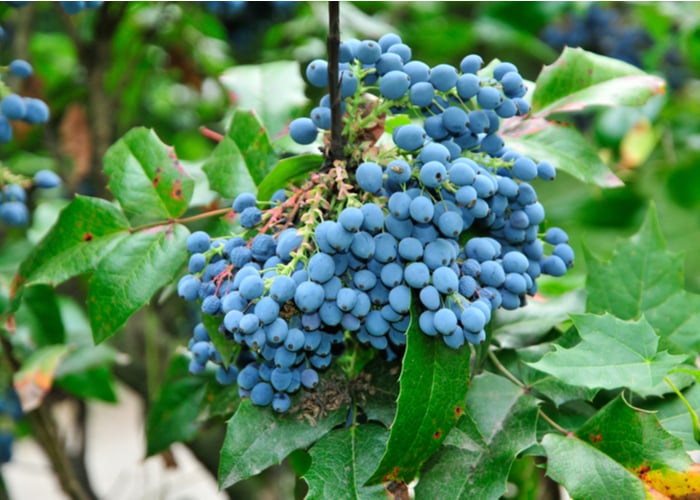
2. Oregon Grape
Oregon grape is a medicinal herbal known for its antimicrobial properties.
It's also a liver tonic that effectively gets rid of parasites like giardia.
For every 20 pounds of your dog's weight, you can give them at least 12 drops of Oregon grape tincture per day.
Note: Do not give Oregon grapes to pregnant dogs and those with liver disease.
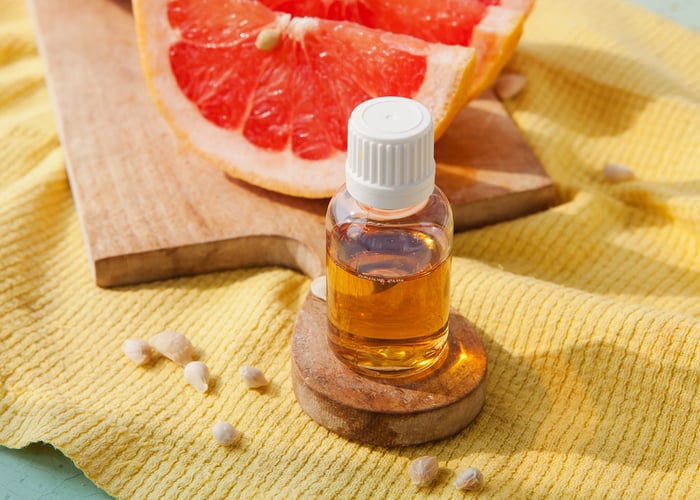
3. Grapefruit Seed Extract
Interestingly, a study finds that grapefruit seed extracts have antimicrobial compounds that can get rid of the following:
- 100 strains of fungus
- 800 bacterial and viral strains
- A large number of single and multi-celled parasites
Moreover, grapefruit seed extracts disrupt unicellular parasites like giardia as quickly as 15 minutes.
Especially in more dilute solutions, this natural extract can destroy giardia's membrane and its cytoplasmic contents.
Dosage: Give 10-15 drops per 10 pounds of canine weight 3 times a day.
As a safety precaution, you can give lesser doses if your dog has allergies or is gut-sensitive.
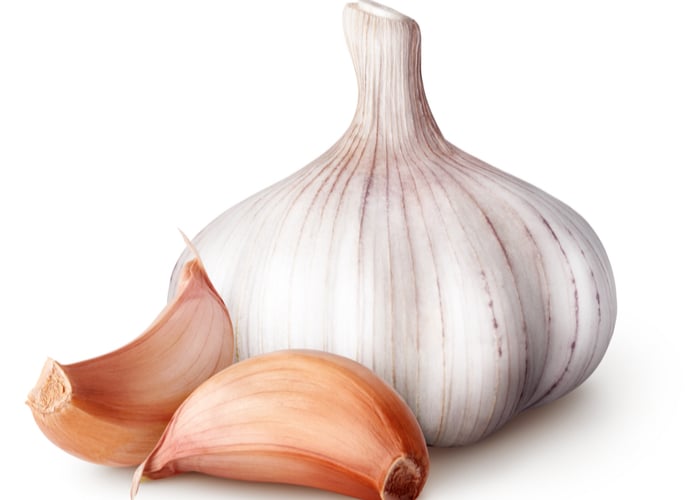
4. Garlic
Other than boosting your dog's immune system, garlic contains allicin, a parasite killer.
In addition, garlic cloves are more effective than powder, so it's easy to use them because you can find them in your kitchen.
But, always remember that too much garlic is dangerous.
So, here's the amount that you need to consider before giving it to your canine:
- Small puppies only ¼ cloves of garlic
- Medium size only ½ cloves of garlic
- The large-size dogs could have ¾ cloves
- While giant ones could have one clove
You can give them the amount once a day. But, consulting your vet is also essential to ensure your dog's safety.
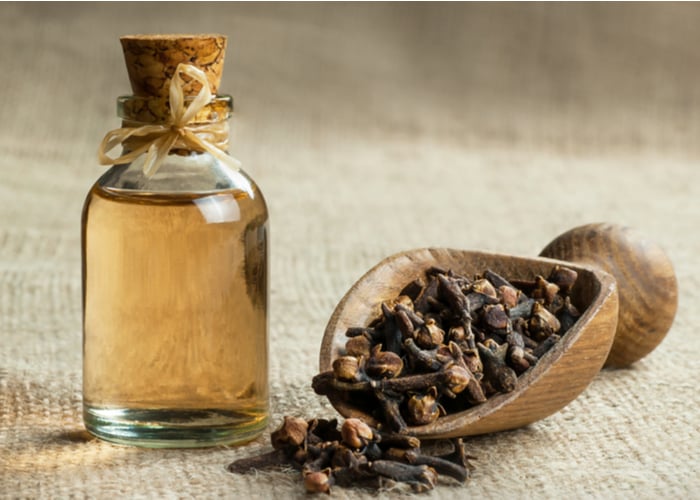
5. Cloves Oil
Cloves oil contains eugenol, which proves to have anti-giardia properties.
Eugenol inhibits the ability of trophozoite giardia to grow and can kill 50% of the population of parasites.
Every day, you can give one clove for every 10 pounds of your dog's weight.
Tip: You can mix it in their food for convenience.
But remember that too much of it can be toxic to them, and it could burn their skin.
So, before giving it to them, be sure to ask your vet.
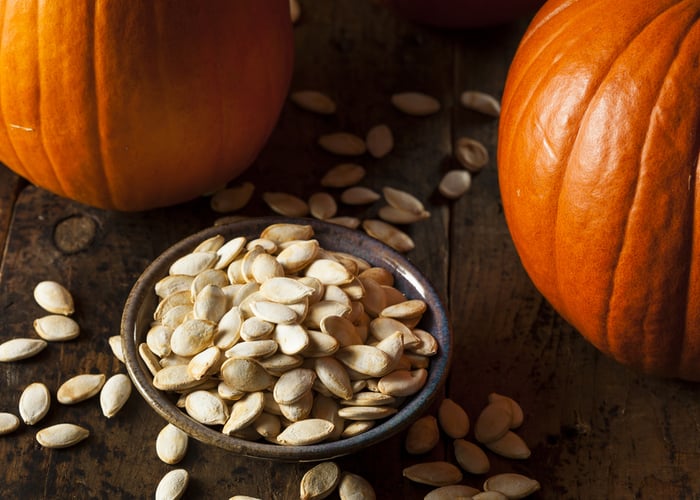
6. Pumpkin seed
Pumpkins have different variations, so they have different levels of effectiveness.
Other pumpkin types contain cucurbitacin, an anti-parasitic and anti-inflammatory component.
Interestingly, there's a debate about the effectiveness of pumpkin seeds in eliminating parasites.
But a study on canine tapeworm claims:
“Microscopically the mature proglottids present a destruction of the tegument involving the basal membrane. In the gravid proglottids there is egg destruction.”
You can give your canines ¼ teaspoon of ground fresh pumpkin seed mixed with their meal.

7. Apple Cider Vinegar
Apple cider vinegar is an anti-parasitic that supports the pH, so you don't have to worry about your dog's digestive tract.
This kind of vinegar is as effective as clove oil.
But, studies show that it targets giardia cysts.
This remedy is great at cleaning contaminated surfaces.
That's because non-diluted vinegar can kill 100% of the giardia cysts during a 60-minute exposure at 21°C.
However, the total inactivation of giardia cysts decreases when vinegar is mixed with water.
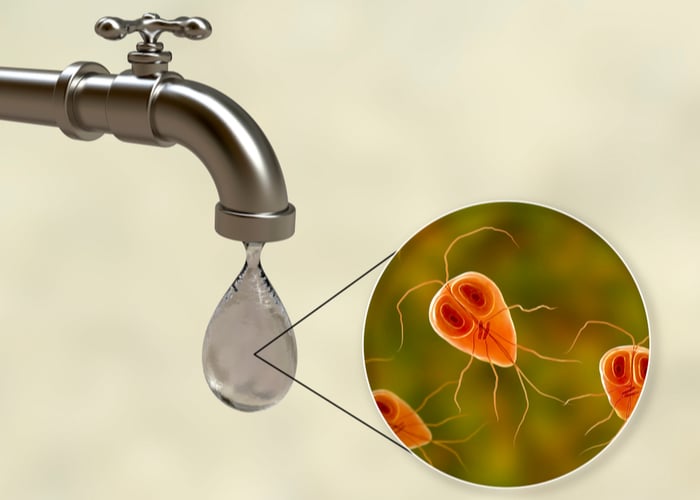
What is Giardia?
You already know the home remedies for giardia in dogs.
But, you might think about what giardia is and how they affect your pets.
Giardia is a single-celled protozoan parasite that infects humans and animals like dogs.
It's also called giardia duodenalis.
Once it reaches its host, this parasite targets and inhabits the intestines and multiplies itself to destroy intestinal parts.
And this parasite can be found on many surfaces like soil, food, and even in water contaminated with poop (feces).
However, you can get infected in direct contact with contaminated surfaces.
Once it infects, it can cause diarrhea called giardiasis.
Furthermore, giardia has two forms: trophozoite and cysts.
The trophozoite is the mature form of giardia that multiplies until it reaches the second stage, the cysts.
In this stage, the giardia now inhabits the feces.
Once cysts infect the intestines of another dog or pet, they'll become trophozoites again and the cycle goes on.
How Do Dogs Get Giardia?
Giardia is a kind of parasite that can thrive in cold temperatures. It can live outside the body, too.
That being said, your dogs can get infected through the following:
- Water and food contamination
- Licking a contaminated surface
- Direct contact on cyst-infested stools
It might be worrisome, especially if you have more than one pet at home.
So, it helps if you can determine its symptoms earlier, which is our next item.
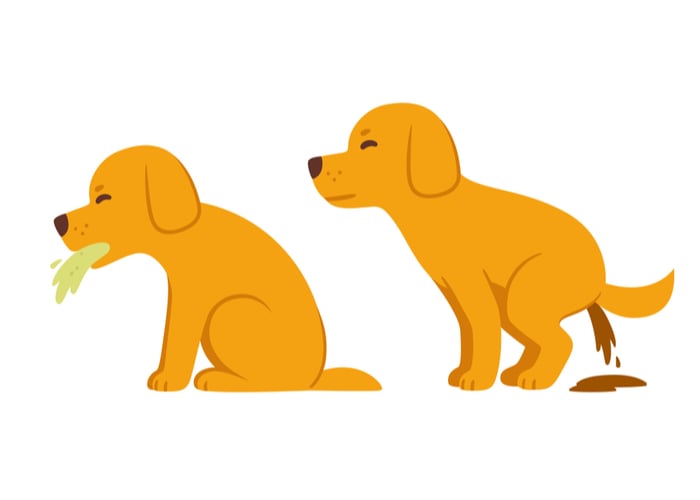
Symptoms of Giardia Infection
Parasites cannot be seen by the naked eye, but there are visible symptoms that you can observe in your dogs, such as:
- Gas
- Nausea
- Diarrhea
- Dull coat
- Vomiting
- Weight loss
- Dehydration
- Stomach pain and cramps
However, you can also see visible signs in their stools, too, such as:
- Appears fatty
- Contains mucus
- Presence of blood
- Extra-foul smelling
- Unusually soft to watery
- Pale-colored or often has a greenish tinge
So, it's vital that your dog's immune system is robust.
As pet guardians, keeping our canines healthy is the best prevention against giardia.

What to Do if My Dog Has Giardia?
Mostly, infected dogs will not feel sick at all.
But, if it does, symptoms might appear 1-3 weeks after they were initially infected.
If you suspect that your dog is infected, go to your vet immediately for a proper diagnosis and treatment.
Some vets recommend a dewormer or antibiotics like fenbendazole and metronidazole. It could be a combination of both or other anti-parasitic medications.
However, giardia treatment in dogs depends on the severity of the symptoms they are experiencing. So, it's essential to consult your vet.
In addition, dog owners rely on natural remedies for giardia in dogs as supplemental medication.
Do Probiotics Help Dogs with Giardia?
The answer is yes! Medications are more effective if taken with probiotics. For example, probiotics like FortiFlora could help antibiotics like metronidazole and Panacur affect better.
Giardia in Dogs: FAQs
How Common is Giardia in Dogs?
Giardiasis is a common parasitic infection in dogs often triggered by the following factors:
- Weaning
- Overcrowding
- Nutritional deficiency
Mostly, dogs that live in shelters are prone to giardia infection.
This is a challenge if you have two or more pets at home.
So, take your dogs on a thorough bath, especially if they've gone outdoors.
Or clean your house with disinfectants to ensure your family and pet's safety.
Are Puppies Also Prone to Giardia?
Puppies are also prone to giardia infections. They're the most vulnerable considering their age, build, and tolerance to the environment. So, puppies also need holistic treatment for giardia in dogs.
How Long Do Giardia Treatments Take Effect?
With proper diagnosis, medications, and treatment, it takes around 2 weeks (minimum) to get rid of giardiasis in your dogs.
What Should I Feed My Dog With Giardia Infection?
Weight loss is one of the symptoms of this infection. If your dog's stool differs in color and consistency, you can feed it bland food in the meantime.
However, be sure to check with your vet regarding this matter.
Are Giardia Parasites Transmissible?
Giardia is transmissible to other animals and humans.
It can pass from dog to human in direct contact with contaminated surfaces or with an infected dog's stools.
Commonly, it's transmitted by drinking contaminated water and food.
Home Remedies for Giardia in Dogs: Before You Go…
Keeping your dogs safe is challenging, especially if you are a beginner.
And with the presence of these microscopic enemies, it's even more infuriating knowing how clueless our pups are while living their best life.
Apart from prescription drugs, the wonderful effects of natural home remedies also have proven scientific evidence.
However, this holistic treatment for giardia in dogs may not be compatible with all dogs.
So, it's vital to consult your vet for the best diagnosis and medication for your canine.


